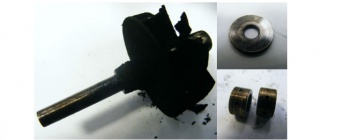
Why it will damage the Turbo
95 per cent of turbo failures caused by oil starvation, contamination or foreign object damage, says BTN Turbo.
Turbochargers can spin at over 6,000 revs per second 360,000 rpm, and endure temperatures of 950 ºC, BTN Turbo explains. Writing in a turbo failure fact sheet for technicians, the company said: “The turbine shaft and bearings rotate in a thin film of oil. “Any fault with the oil supply to the turbo means its bearings are likely to fail before the engine’s main bearings. This marking is evidence of contaminated oil. “Running a turbo without oil for five seconds is as harmful as running an engine without oil for five minutes.” The supplier is warning technicians to diagnose what caused the turbo to fail before fitting a new one, or risk the replacement failing too. “It’s essential that that the oil feed pipes to the turbo are clean and clear, so you are certain they can supply uncontaminated oil, at the right pressure. “Contaminated or dirty oil will scratch or score the bearings, leading to rapid ear and ultimately turbocharger failure.”
Causes of contaminated oil;
- Blocked, damaged or poor quality oil filter
- High carbon build-up in the engine
- Accidental contamination of new oil during servicing
- Malfunctioning oil filter bypass valve
- Engine wear, leaving swarf deposits in the oil
- Oil degradation from excessive temperatures or extended service intervals.
Preventing turbo failure caused by contamination
- Always use fresh oil and new oil filters when fitting a new turbo.
- Ensure the correct grade of oil is used.
- Clean or replace oil inlet pipes to eliminate any carbon deposits or sludge that could enter the turbo or restrict oil flow to bearings.
Garage Wire 10/5/16


 Click here to open the navigation menu
Click here to open the navigation menu